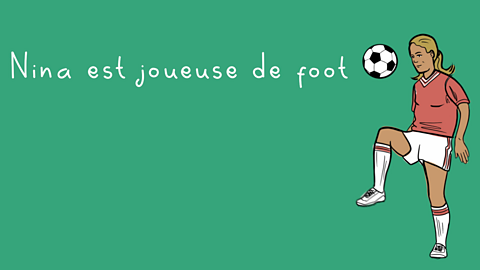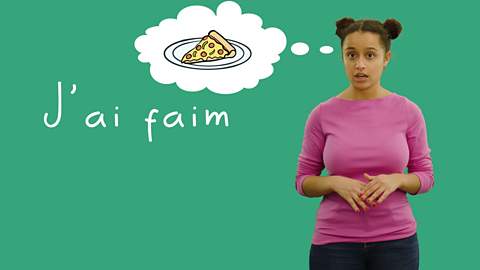Adjectives: How to describe people, places and things in French
You're going to want to describe nouns in French.вҖҺ
J'ai un chien - I have a dog is nice butвҖҺвҖҰ J'ai un chien mignon - I have a cute dogвҖҰ is better!вҖҺ
The first thing to notice is that adjectives in French usually go after the noun.вҖҺ
J'ai une porte verte - I have a green door.вҖҺ
The next thing to notice is that the adjective must agree with the noun. вҖҺ
Une porte is a feminine noun which means that the adjective vert has a вҖҺfeminine ending 'e'.вҖҺ
If you have more than one of something like deux lapins blancs - two white вҖҺrabbits, lapins is plural. Which means that the adjective has to be plural too. blancs has an s at the end.вҖҺ
If you have more than one girl les filles then any adjective has to be feminine вҖҺand plural.вҖҺ
So content adds an e and an s - les filles contentes - the happy girls. Usually adjectives in вҖҺFrench come after the noun but there are a few that don't.
beau - beautiful, comes before the noun,вҖҺ
bon - good, un bon livre - a good book,
and grand and petit also go before the noun.
Ma petite sЕ“ur - My little sister. вҖҺ
Mon grand lit - My big bed.вҖҺ
Now where's my cute black dog? **OГ№ est mon chien mignon et noir?**вҖҺ
What is an adjective?
Adjectives are describing words. They tell us more information about nouns, such as the вҖҺcolour, size, age, etc.вҖҺ
Examples of adjectives include:
| French | English |
|---|---|
| bleu | blue |
| grand | big |
| petit | small |
| nouveau | new |
| vieux | old |
Where do adjectives go in relation to nouns?вҖҺ
In French, adjectives usually go after the noun:вҖҺ
- JвҖҷai un chat noir - I have a black cat.вҖҺ
- Mon pГЁ°щұр a les cheveux courts - My dad has short hair.вҖҺ
However, most of the BAGS adjectives go before the noun. BAGS stands for Beauty, Age, вҖҺGoodness and Size.
| Beauty | Age | Goodness | Size |
|---|---|---|---|
| beau / belle вҖҺв¶ДҺ(ІъұрІ№іЬіЩҫұҙЪіЬұф)вҖҺ | vieux / vieille (ҙЗұф»е)вҖҺ | bon / bonne (good) | grand(e) (ІъҫұІө)вҖҺ |
| joli(e) (ұи°щұріЩіЩІв)вҖҺ | nouveau / nouvelle вҖҺв¶ДҺ(ІФұр·Й)вҖҺ | mauvais(e) (ІъІ№»е)вҖҺ | petit(e) (small) |
For example:вҖҺ
- JвҖҷhabite dans une grande maison - I live in a big house.вҖҺ
- Ma copine a une nouvelle tortue - My friend has a new tortoise.вҖҺ
How do adjectives вҖҳagreeвҖҷ with the noun?вҖҺ
Most adjectives in French change depending on whether they are describing a masculine, вҖҺfeminine or plural noun. The usual endings are as follows:вҖҺ
| masculine singular | masculine plural | feminine singular | feminine plural |
|---|---|---|---|
| (no ending) | вҖҺ-s | -e | -es |
- JвҖҷai un vГ©lo vert - I have a green bike.вҖҺ
- Tu aimes les haricots verts? - Do you like green beans?вҖҺ
- Ma tante mange une pomme verte - My aunt is eating a green вҖҺapple.вҖҺ
- Mon oncle aime les voitures vertes - My uncle likes green cars.вҖҺ
There are some exceptions to this rule, however: вҖҺ
| masculine singular | masculine plural | feminine singular | feminine plural |
|---|---|---|---|
| вҖҺun jeune іуҙЗіҫіҫұрвҖҺ вҖҺ(a young man)вҖҺ | вҖҺdes jeunes hommes вҖҺ(some young men)вҖҺ | вҖҺune jeune femme вҖҺ(a young woman)вҖҺ | des jeunes ҙЪұріҫіҫұрІхвҖҺ вҖҺ(some young вҖҺwomen)вҖҺ |
| вҖҺun homme heureux вҖҺ(a happy man)вҖҺ | des hommes вҖҺheur*eux * вҖҺ(some happy men)вҖҺ | вҖҺune femme вҖҺheureuseвҖҺ вҖҺ(a happy woman)вҖҺ | вҖҺdes femmes вҖҺheureuses вҖҺ(some happy вҖҺwomen)вҖҺ |
| un homme sportiвҖҺfвҖҺ вҖҺ(a sporty man)вҖҺ | des hommes вҖҺsportiвҖҺfІх вҖҺ(some sporty men)вҖҺ | une femme sportiвҖҺve вҖҺ(a sporty woman)вҖҺ | des femmes вҖҺsportives вҖҺ(some sporty вҖҺwomen)вҖҺ |
| вҖҺun homme fier вҖҺ(a proud man)вҖҺ | des hommes fiвҖҺe°щІх вҖҺ(some proud men)вҖҺ | вҖҺune femme fiГЁ°щұр вҖҺ(a proud woman)вҖҺ | вҖҺdes femmes fiГЁ°щұрsвҖҺ вҖҺ(some proud вҖҺwomen)вҖҺ |
| un gentil ІөІ№°щГ§ҙЗІФвҖҺ вҖҺ(a kind man)вҖҺ | des gentils ІөІ№°щГ§ҙЗІФІхвҖҺ вҖҺ(some kind men)вҖҺ | une gentille ҙЪұріҫіҫұрвҖҺ вҖҺ(a kind woman)вҖҺ | des gentilles вҖҺҙЪұріҫіҫұрІхвҖҺ вҖҺ(some kind women)вҖҺ |
Some of the BAGS adjectives are irregular:вҖҺ
| English | Masculine вҖҺsingular | Feminine вҖҺsingular | Masculine вҖҺplural | Feminine plural |
|---|---|---|---|---|
| beautiful | beau, bel | belle | beaux | belles |
| old | vieux, вҖҺvieil | vieille | vieux | vieilles |
| new | nouveau, вҖҺnouvel | nouvelle | nouveaux | nouvelles |
Examples using BAGS
Beautiful
- Le bel homme - The handsome man.вҖҺ
- Le beau chien - The beautiful dog.вҖҺ
- La belle maison - The beautiful house.вҖҺ
Old
- La vieille maison - The old house.вҖҺ
- Un vieux vГ©lo - An old bike.вҖҺ
New
- La nouvelle maison - The new house.вҖҺ
- Un nouveau вҖҺcinГ©ma - A new cinema.вҖҺ
Nouveau, vieux and beau become nouvel, vieil and bel when used to describe a вҖҺmasculine noun that starts with a vowel or an вҖҳhвҖҷ: вҖҺ
- Un nouvel ami - A new friend. вҖҺ
- Un vieil homme - An old manвҖҺ.
- Un bel appartement - A nice flat.
Quiz
Find out how much you know about adjectives in French in this short quiz.
Game - FestiLingo: French. game
Visit the festival and practise French language skills in this game

More on Grammar
Find out more by working through a topic
- count3 of 7

- count4 of 7
